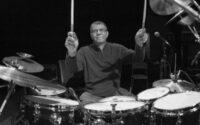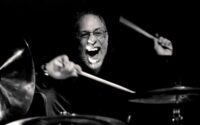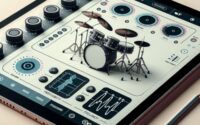On November 12, the news of the death of Roy Haynes – one of the greatest and most recorded drummers in jazz history – hit the music world. In a career that spanned 80 years, he explored such styles as swing, bebop, jazz fusion, and avant-garde jazz.

Photo via yamaha.com
Roy Owen Haynes was born on March 13, 1925 in Roxbury (a district of Boston), USA. His parents were from Barbados, and his brother Michael was one of the leaders of the African-American community in the state of Massachusetts and a close associate of Martin Luther King’s.
This is what he said about his beginnings in an interview conducted by American double bass player, Christian McBride:
I think the drums discovered me. I lived in the Roxbury section of Boston. On the street that I lived on there was a drummer that had played with that band. His name was Herbert Wright. The other end of the street was another drummer named Bobby Donaldson, and I was surrounded by all of these drummers. I have had a feeling ever since I could remember to want to play drums. I was always [playing] with my hands in school. In fact, they pulled me out of school once for playing on the desk. […] The teacher didn’t like that at all. So he sent me to the principal’s office saying that I had disturbed the class, and the principal said, “Don’t come back to the school unless you bring one of your parents with you.” I had always wanted to play drums. I’d be playing on my mother’s dining room table and dishes and I would just be breaking up everything. I started from there. My father had introduced me to Herbert Wright and that’s when I started my first drum lessons. […]

Photo via drummerworld.com
I didn’t have a set of drums, but I started getting it piece by piece. The group of guys I hung out with. […] This other neighborhood, which was close to Roxbury, we would go to one of my buddies who lived in the building and I think his parents would take care of the furnace in that big building. So that’s where we would hang out, like our own club. One day this guy named Griffin, he had come into the club with a trap case with a snare drum in it and some cymbals and some drumsticks. I never to this day found out where he got it. But that was my first snare drum and cymbals. He is not living now, but he was kind of fast, so you will just have to use your own imagination where they came from. I started getting gigs and I didn’t have my hi-hat when I started. I just had to play the cymbal with one stick and choke it and open it like a hi-hat does. I got this gig in the Borden Square section of Boston, the Italian section, and the trumpet player said, “Hey, why don’t you get a hi-hat?” I finally got a hi-hat later.
Haynes made his debut on the local Boston scene in 1942, working with guitarist Tom Brown, bandleader Sabby Lewis and alto saxophonist Pete Brown. After moving to New York, he had the opportunity to play with none other than Louis Armstrong:
In Harlem, you’d bump into anybody. One day I’m standing there, at 126th Street and 8th Avenue, which was the Mecca for us. It was October 1946. I’m just standing there. Louis Armstrong’s band is getting ready to do a tour through the South. The bus is sitting there. Armstrong says, “Roy Haynes! Our drummer is sick. We need a drummer.” I lived on 149th Street. I got the bus and went and got my bag. He said, “You don’t need your drums.” I went with Louis Armstrong down South for six concerts in a bus. We weren’t flying. The drummer in the big band was always tight with the lead trumpet player. You would sit next to him. They didn’t have no drum parts. He would tell me everything. Don’t forget that. Roy Haynes played with Louis Armstrong! Put that in your book.

In 1945, he received an offer to join Luis Russell’s band (an associate of Louis Armstrong), with whom he performed at New York’s legendary Savoy Ballroom. From 1947 to 1949 he performed with saxophonist Lester Young, spent the next four years in the Charlie Parker Quintet, and from 1954 to 1959 toured the world as a member of Sarah Vaughan’s band. The years 1959 to 1960 saw him touring with Thelonious Monk, and the following year he worked extensively with Eric Dolphy. During the next four years he played in Stan Getz’s band while simultaneously recording and performing with the John Coltrane Quartet (1963 – 1965). He collaborated with Chick Corea on several occasions, starting in 1968, and with Pat Metheny in the 1990s.

He made his studio recording debut with Lester Young in 1947, and recorded his last album in 2011 at the age of 86. In the meantime, he was featured on over 120 studio, live and compilation albums as a sideman, as well as over 30 as a bandleader or co-leader.
Apart from the aforementioned artists, he collaborated with such jazz giants as: Bud Powell, Miles Davis, Sonny Rollins, Art Blakey, Ray Charles, McCoy Tyner, Archie Shepp, Jack DeJohnette, Pharoah Sanders, Dave Brubeck, or Freddie Hubbard.

Awards and honours:
- Berklee College of Music honorary doctorate (1991)
- The Danish Jazzpar prize (1994)
- NEA (U.S. National Endowment for the Arts) Jazz Master (1995)
- Chevalier de l’Ordre des Arts et des Lettres (France’s top literary and artistic honour, 1996)
- Modern Drummer Hall of Fame induction (1999)
- Multiple DownBeat magazine Critics Poll and Reads Poll winner
- DownBeat magazine Hall of Fame induction (2004)
- New England Conservatory honorary doctorate (2004)
- Mid Atlantic Arts Foundation’s BNY Mellon Jazz Living Legacy Award at the Kennedy Center for the Performing Arts in Washington, DC (2010)
- 8 Grammy nominations
- 3 Grammys incl. a Grammy Lifetime Achievement Award (2010)
- Peabody Medal (the highest honor bestowed by the Peabody Institute of The Johns Hopkins University, 2012)
- Jazz Foundation of America Lifetime Achievement Award (2019)
People ask me, “What is your secret?” I never thought of things as being really a secret as far as approaching the drums and so-called jazz. I play from feeling as you can tell. I didn’t try to have a lot of sharps particularly. A lot of it is the street-the sounds of some bugles or drum rolls and stuff like marching down the street in the ghetto. I play from feeling – Haynes told Christian McBride.
Roy Haynes passed away on November 12, 2024 r. in Nassau County, New York.

Tributes from high-profile members of the drumming community started pouring in already on the day of his passing. Here are some of them:
Billy Cobham: I just lost another of my mentors, “Uncle” Roy Haynes………. 1925 to 2024: my first meeting with him was in 1960 in his nephew, Artie Simmons basement. At 16 years old I thought I knew pretty much everything about playing the drums. When Roy played the same drum set as I had just gotten up from I could not believe what I had experienced on that afternoon and still see flashes of it in my mind’s eye today. It was a sobering experience to say the least. Like Quincy, Roy Haynes’ legacy will live on in those of us who witnessed him live, on recordings or on any type of media from the 20th century to the present. “We Were The Fortunate Few” to have been given such a great opportunity. To be an artist it’s all about the gathering of knowledge. Eternal Thanks Uncle Roy. Billy C
Peter Erskine: When you listened to Roy Haynes play, it was as if the music sent you a postcard saying, “Greetings from the future. Wish you were here!” RIP, maestro.
Michael Schrieve: RIP ROY HAYNES. THE KING IS DEAD!
Lenny White: ROY HAYNES. THE LAST OF THE MAGNIFICENT HAS PASSED. I’M HEARTBROKEN
Todd Sucherman: RIP Roy Haynes. He was playing until 99. From Louie Armstrong to Charlie Parker, Coltrane, to Chick Corea and Pat Metheny. What a life, what a career. For the uninitiated, may I suggest Chick Corea’s “Now He Sings, Now He Sobs” from 1968. A Roy Haynes masterpiece.
Sources:
https://pl.yamaha.com/pl/artists/r/roy-haynes.html
https://www.rollingstone.com/music/music-news/roy-haynes-jazz-drummer-dead-obituary-1235164537/
https://edition.cnn.com/2024/11/13/entertainment/roy-haynes-death-scli-intl/index.html
https://www.nytimes.com/2024/11/12/arts/music/roy-haynes-dead.html
https://www.washingtonpost.com/obituaries/2024/11/12/roy-haynes-jazz-drummer-dies/
https://en.wikipedia.org/wiki/Roy_Haynes
https://jazztimes.com/archives/roy-haynes-im-not-a-metronome/









